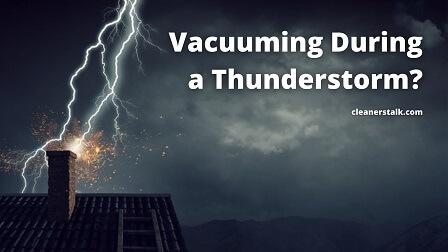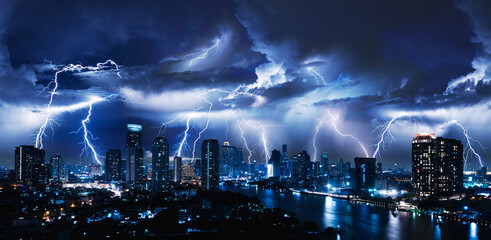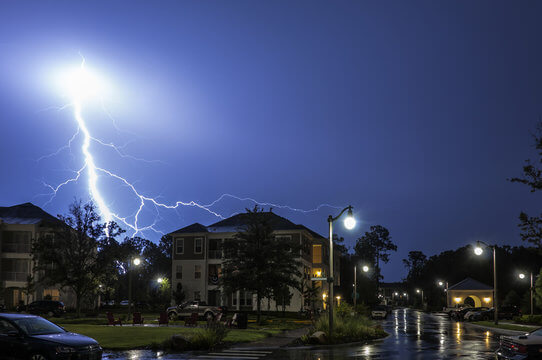
Is it Safe to Vacuum During a Thunderstorm?
Cleaners Talk is reader-supported. This post contains affiliate links, we may earn a commission at no additional costs to you. As an Amazon Associate we earn from qualifying purchases.
Thunderstorms can be quite scary even if you are indoors: you hear thunder and intense rain pounding on the roof, you see lightning, and you start getting worried about your safety - overall, it's not a pleasant experience.
You’ve probably even heard the common advice that you shouldn’t use your electrical appliances like your laptop, fridge, and vacuum cleaner during a storm. So, is it safe to vacuum during a thunderstorm?
Vacuuming with a cordless vacuum is safe, but vacuuming with a corded vacuum during a thunderstorm can be dangerous. In fact, not only should you not use a vacuum cleaner, but you should unplug electric appliances from their sockets to minimize the chance of lightning causing damage to your house.
Not everybody knows what to do during a thunderstorm, so we have compiled a list of things you should and shouldn’t do to stay safe. Although the chances of lightning actually hitting your house are slim, your power supply and the electricity grid in your city can be negatively affected in other ways.
Lightning Can Cause Major Power Damage
As you probably already know, lighting is the most dangerous part of any thunderstorm unless you have a leaky roof, in which case, the rain won’t be too helpful for you either. A lightning flash is an electrical discharge originating in the clouds during a thunderstorm, and it often aims to strike the ground.

In fact, according to Nationwide, lightning killed an average of 31 people a year between 2006 and 2015, and injured another 279. That is a relatively high number folks!
Because so much electrical energy is contained in lightning bolts, they usually try to find the fastest way to the ground. One of the ways they do that is by striking tall objects such as trees or lightning rods so that the lightning can travel unimpeded.
Electricity cables in the air are especially vulnerable during thunderstorms because they are attached to long wooden rods intended to form a power grid and supply an area with electricity.
Luckily, most modern towns and cities have moved their power cables to run underground, which effectively decreases the chance that a thunderstorm would cause a major power outage.
Flashes of lightning can cause damage in one of the two following ways:
- First, lightning can cause direct damage if it strikes your house or a pole near your house - this often results in all electrical appliances being damaged and results in a house fire due to the high temperature of the lightning bolt.
- The second way lightning causes damage is indirectly (as we stated previously) by causing an outage in the power grid when it hits a vital area, even if it is miles away from your house. The lightning can strike air conductors, and this surge voltage can be passed through the ground, meanwhile destroying the power equipment of a whole city.
Is It Safe to Vacuum During a Thunderstorm?
From a safety standpoint, you can technically vacuum during a thunderstorm if you are using a cordless vacuum cleaner. Because they are not connected to an electrical power source, they are not considered an electrical appliance. But if you are using a corded vacuum cleaner, then it is simply not safe.
With that out of the way, let's see how a thunderstorm affects electrical appliances...
How Are Electrical Appliances Affected
Electrical appliances are any devices plugged into the power grid through a socket in your house.
In the U.S., power sockets have a voltage of around 120 volts. In other parts of the world, that number goes up to 240 volts. As you can imagine, the power sockets in our houses were not built to withstand the amount of electricity they experience when they are hit by a current with millions of volts of power like lightning.
This voltage surge from the lightning can cause any devices that are plugged into a power socket to short circuit or fry. So, when there is a surge in a city’s electricity grid during a thunderstorm, it is already too late to save your plugged-in appliances.
This is why it is recommended that you unplug all of your electrical appliances before the storm hits. Do not use any electrical devices like a hairdryer or a corded vacuum cleaner.
While most small appliances are definitely more susceptible, some large appliances have built-in protections that allow them actually to withstand some surges. It all depends on whether the device has electrical or mechanical controls - appliances with mechanical controls are usually less likely to be affected.
You can check the specifications for your vacuum cleaner or other appliance in the user’s manual.
However, it is generally recommended to not vacuum during a thunderstorm - your daily chores can probably wait for the lightning and thunder to simmer down. Unplugging all of your devices is your best bet for staying as safe as possible inside your house during a storm.
There are also a variety of other things that you shouldn’t do during a thunderstorm that people don’t often think about, so we have compiled a list of tips for maximum security.
What Not To Do During a Thunderstorm

We are all busy people living busy lives, and we don’t often stop to think or register that there is an incoming thunderstorm in our area. While it may not always be possible to implement every safety tip that experts recommend, it is a good idea to keep all of these in mind if a storm gets really serious.
As we have already discussed, using plugged-in appliances of any sort is a no-go (with small exceptions). Whether it’s your phone charger, your hairdryer, your dorm-seized refrigerator, your TV, or your vacuum, make sure you unplug all of these.
Unplugging your fridge may be more of a nuisance than the rest because it can cause your food to spoil so that one is up to you – the fact is that most people choose to leave their fridges plugged in.
Another tip that is harder to implement in practice is disconnecting your internet cable. You are probably wondering, “what am I going to do without the internet until the storm passes?” and that is a reasonable concern. Still, if you want to go all the way regarding your safety during a storm, then this must be done.
On the other end of the spectrum, you should also avoid using a landline phone - this piece of advice would be much easier to do because almost everyone owns a smartphone nowadays.
Surprisingly, using your water supply, in addition to your electricity supply during a thunderstorm, is also not a great idea. This may be counterintuitive to some, but during a storm, you shouldn’t:
- Shower
- Take a bath
- Wash dishes
- Do laundry
Similar to the landline phone wires, the electricity from the lightning can travel through the pipes in your house, and you can get hit by the current via the pipes. Moreover, a lot of currents can be distributed through the water, so in this case, being wet offers no protection.
Lastly, you shouldn’t go outside under any circumstance, and you should also try to keep away from your windows because they can conduct electricity too.
Modern Buildings Have Preventative Measures
Luckily, many modern buildings are protected against thunderstorms and lightning bolts in one way or another. They have what is called lightning protection systems. These systems can do the following:
- Protect the structure of the building from direct lightning.
- Protect the building’s inhabitants from direct lightning.
- Protect the inhabitants from potential fires as a result of the lightning.
It is a common misconception that lightning protection systems such as rods attract lightning, but that is false. Lightning rods do not attract lightning bolts, and they also cannot prevent lightning from striking them.
Interestingly, no lighting protection system actually offers surge protection for electrical appliances. Lightning protection has always been focused on preserving the building and its occupants. Protecting electrical appliances that can easily be replaced has never been a priority.
So, is it safe to vacuum during a thunderstorm? It can wait. When we say that unplugging your devices is the only way to prevent them from getting damaged, we really mean it – and that includes your vacuum cleaner!
Use Cordless Vacuum Cleaner During a Thunderstorm
However, if you must clean your house during a thunderstorm, then you can use a cordless vacuum cleaner. A cordless vacuum cleaner is not connected to an electrical socket so there is no risk of damage from a lightning bolt. Seriously though, we think that cleaning your house can wait until the thunderstorm subsides. 🙂
Related articles:

Ryan O'Connor
I write about house cleaning and vacuum cleaners. For me, nothing is more important than a clean environment to ensure both a healthy and happy life. Learn more.
